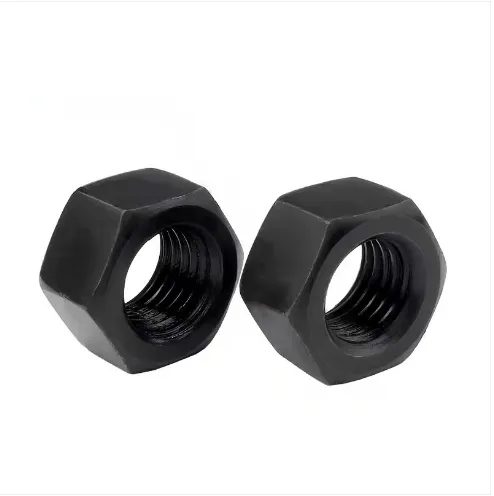1 3 8 stud bolt factories
Sep . 25, 2024 14:45 Back to list
1 3 8 stud bolt factories
The Significance of 1% 3% 8% Stud Bolt Factories in Modern Industry
In today’s increasingly complex manufacturing landscape, the role of specialty fasteners such as studs has become pivotal. Stud bolts, in particular, serve crucial functions across various industries, from automotive to aerospace, construction, and oil and gas. The evolution of manufacturing processes has led to the establishment of stud bolt factories that specialize in producing these essential components, categorized by their yield strength - 1%, 3%, and 8%. Each category signifies a different level of strength, composition, and application suitability, making them vital to understand for engineers, manufacturers, and stakeholders alike.
Understanding Stud Bolts
Stud bolts are threaded rods, often utilized in conjunction with nuts to create bolted joints. Their design facilitates the joining of heavy machinery and structures, requiring a strong and reliable fastening method. The dimensions, materials, and strength classifications associated with stud bolts are critical to ensuring the right application in a specific environment. The 1%, 3%, and 8% classifications refer to the percentage of yield strength in the material, allowing for effective designs that ensure safety and performance in the most demanding conditions.
1. 1% Stud Bolts These typically have a yield strength of around 1% of the tensile capacity of the material. Commonly produced from lower strength steel, these bolts are often used in applications where the load is moderate and doesn't require high strength. They are essential in areas such as residential construction, where structural loads are lower and a gentler approach to fastening suffices.
2. 3% Stud Bolts Offering a medium strength, these bolts are made from higher-grade materials and are used in applications that require a robust fastening solution. Their increase in yield strength makes them suitable for mid-range tasks in industries like automotive manufacturing or heavy machinery assembly. Here, the balance between weight and strength is often a critical factor.
3. 8% Stud Bolts These are engineered for high-stress applications, with yield strengths significantly greater than those of the 1% and 3% alternatives. Typically crafted from high-strength alloys, 8% stud bolts find their applications in sectors such as nuclear power plants, aerospace, and oil and gas industries, where safety and reliability are paramount.
1 3 8 stud bolt factories

The Role of Stud Bolt Factories
The proliferation of stud bolt factories capable of producing these three categories of fasteners represents a significant leap in infrastructure and manufacturing capabilities. Modern factories employ advanced technologies such as Computer Numerical Control (CNC) machining and automated production lines, ensuring precision and efficiency. This level of technology enhances the overall quality and consistency of stud bolts, which is critical in high-stakes applications.
Moreover, these factories often incorporate quality control measures at every stage of production. From raw material selection to final inspection, ensuring that each bolt meets stringent industry standards is non-negotiable. This attention to detail not only minimizes risk but also boosts the overall reliability of the end product.
Conclusion The Future of Stud Bolt Manufacturing
As industries evolve, the demand for specialized stud bolts will only increase. The need for high-quality fasteners that can withstand extreme conditions and varying load factors means that stud bolt factories must continuously adapt and innovate. Research into new materials, such as composites or advanced alloys, may redefine the limits of strength and weight for fasteners.
In a world where safety standards continue to rise, the importance of trusted manufacturers and reliable fasteners cannot be overstated. The focus on 1%, 3%, and 8% stud bolts signals an era of specialized production that addresses the diverse and varying needs of modern industry. As we look to the future, investing in effective, efficient manufacturing processes will be essential for ensuring the continued success and safety of infrastructure and machinery worldwide. The role these factories play in our economy is not only vital but also integral to the functioning and advancement of multiple sectors. With ongoing advancements and innovations, the stud bolt industry is poised to meet the challenges of tomorrow's engineering requirements.
Latest news
-
High-Quality Panel Stud Bolt Reliable Panel Stud Bolt Factory & Suppliers
NewsJul.08,2025
-
High-Precision Fine Thread Locknuts Manufacturer & Supplier Custom Solutions
NewsJul.08,2025
-
PH Imperial Stud Bolt – High Strength Fasteners from Leading Supplier & Factory
NewsJul.07,2025
-
High-Quality Allen Wrench Bolts Leading Factory, Company & Suppliers
NewsJul.07,2025
-
Wholesale Ball Stud Bolt - High Quality Supplier & Factory Price Reliable Wholesale Ball Stud Bolt Company
NewsJul.06,2025
-
High-Strength Alloy Bolts Manufacturer & Supplier Quality Alloy Fasteners Factory
NewsJul.06,2025
